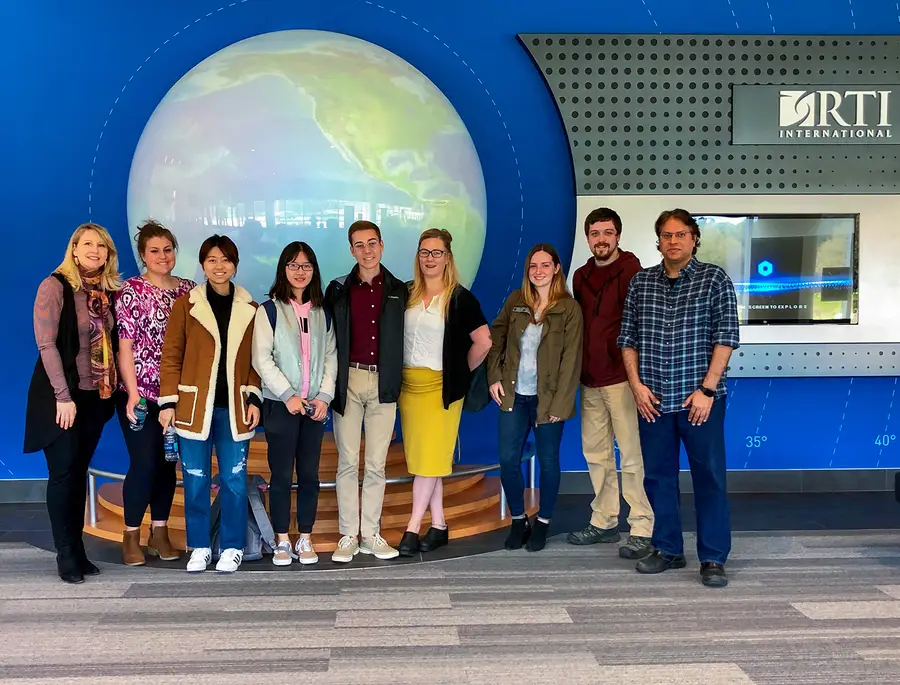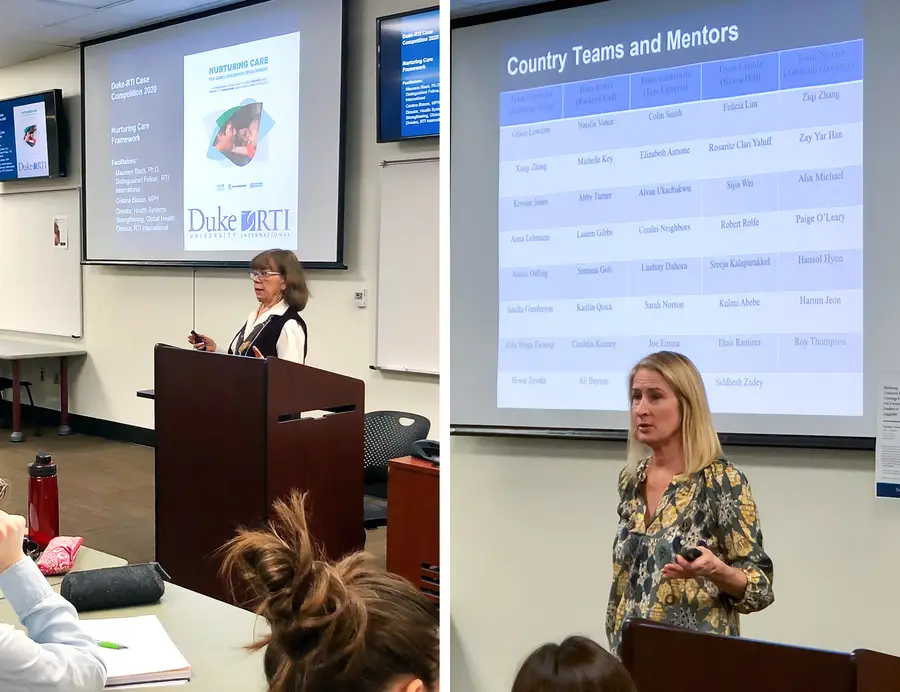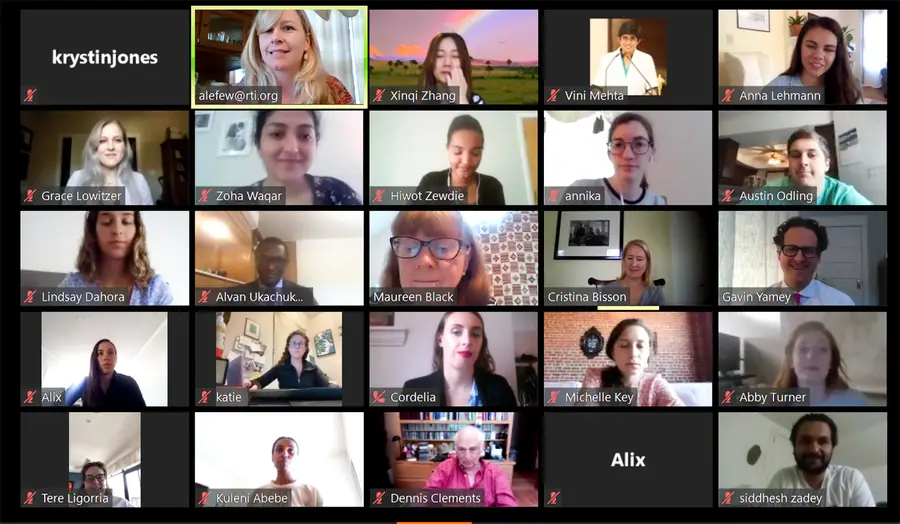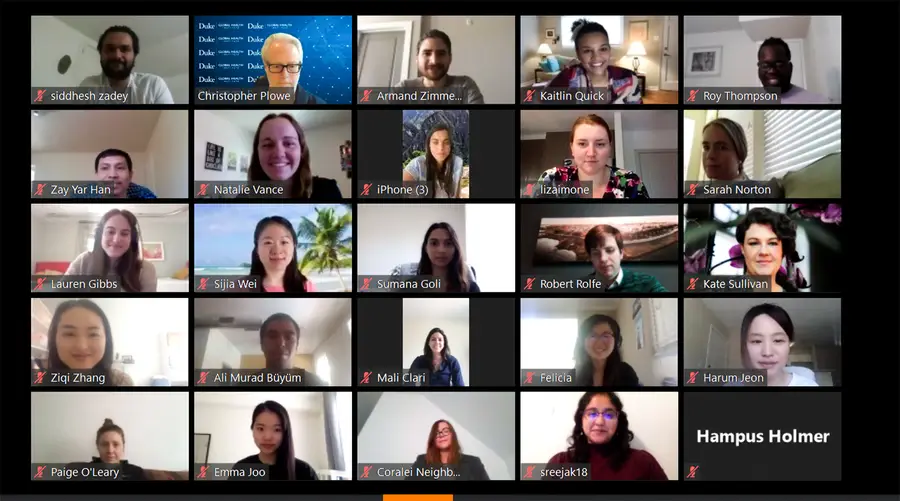
For years, the team-based Policy Idol case study assignment crafted by Duke Professor Dr. Gavin Yamey has inspired creative and competitive juices alike – he calls it “American Idol, but for health policy!” A core element of his popular global health policy and systems course for grad students, Policy Idol focuses on a topical issue that challenges students to apply what they have learned in the classroom to a real-world global health issue.
As part of the RTI-Duke Global Development Initiative (GDI), an ongoing effort that promotes working relationships among experts in key development sectors, RTI experts have partnered closely with Yamey over the past two years to develop the focus of the Policy Idol case competition and deliver guest lectures for the course. Students are divided into small teams, assigned a low- or middle-income country and an RTI mentor, and tasked with developing a research-informed policy proposal that addresses a global health issue, culminating in presentations judged by a panel of health experts at the end of the semester. The opportunity for students to engage directly with global health industry leaders as mentors has been instrumental in grounding the academic learning experience in real world application and expanding professional networks.
“Collaborating with RTI has been an extremely effective way to bring health systems expertise and experience into the classroom and add a powerful “real world” dimension to the class. The case-based learning, in which students work in teams to develop a policy proposal that tackles a challenge that RTI sets, is one of the elements of the course that gets the best evaluations from students.” -Dr. Gavin Yamey, Associate Director for Policy, Duke Global Health Institute

This spring semester, my RTI colleagues Dr. Maureen Black and Cristina Bisson helped craft Policy Idol’s original technical focus, the Nurturing Care Framework, and served as judges for the competition. Duke teams were geared up to tackle this global health issue; however, none of us imagined that by mid-March, universities around the world would be forced to close campuses and transition learning online due to the COVID-19 pandemic.
Pivoting Learning to Address a Global Pandemic
As Duke announced its campuses would close for the remainder of the academic year, faculty faced a shift to remote instruction and grappled with strategies to best support students in adjusting to a “new normal.” The campus closure occurred during spring break, so some of Yamey’s students returned to Durham while others remained in other parts of the U.S. and around the world. Sensing students’ anxiety and responding to their desire to apply their learning to the biggest public health challenge the world has seen in decades, Yamey and RTI colleagues quickly pivoted Policy Idol to focus on COVID-19, with an updated concept note and policy questions. The students were asked to continue to work together through virtual connections to research and propose nuanced recommendations for strengthening response to the pandemic in their assigned countries. It was something they could sink their teeth into.
With the COVID-19 pandemic, Policy Idol became a platform for students to contribute to the fight against a very real and very pressing global health threat. Moreover, students had a valuable opportunity to share their country-specific policy solutions with local decision makers with the hope that their work would help guide efforts to better prepare national health systems for the global pandemic." -Armand Zimmerman, Teaching Assistant, Duke Global Health Institute


Innovative Policy Solutions with Real-World Applications
On April 9th, students called in via Zoom from all over the world to present their final policy proposals for how to address COVID-19 in Cambodia, Guatemala, Kenya, Nigeria, and Uganda. Dr. Chris Plowe, Director of the Duke Global Health Institute, joined Black and Bisson as judges. The students’ presentations were rich in context, insightful, and reflective of collaborative learning.
Team Cambodia highlighted the potential for infringement on civil liberties by the autocratic government’s COVID-19 response and proposed to elevate and strengthen the National Public Health Emergency Operation Center’s role in addressing the pandemic. Team Guatemala demonstrated constraints related to historical underfunding of the health sector, and proposed policy additions to strengthen community health worker networks for screening and education; monitor and evaluate the receipt and benefits of stimulus and government aid packages; and increase future financing for health. Team Kenya utilized the “Three Delays Framework” to present their proposed plan for strengthening emergency health systems capacity, including developing efficient nationwide distribution of supplies to all 47 counties; increasing the number of trained healthcare workers; and improving communication within and between counties and the Ministry of Health. Team Nigeria presented its policy and financing recommendations based on a deep-dive into the epidemiology, realities of the health system, and current preparedness of the country. This included proposing immediate interventions to limit virus transmission, prepare the health system, and flatten the curve; and long-term policy recommendations focused on vaccine development, access, and financing. Team Uganda built on existing pandemic surveillance and response systems to propose expansions in health education, supportive cash transfers, and inclusive feedback from civil society and communities to strengthen the government’s response.
“It has been rewarding to work with Gavin’s students over the last two years, providing guest lectures and leadership for the Policy Idol competition. This semester it was particularly inspiring to see how the students fully embraced the experience and adjusted their research and learning when COVID-19 disrupted their semester.” -Cristina Bisson, RTI Director of Health Systems
After the presentations, the Judges huddled in a Zoom breakout room while students greeted and congratulated each other through Zoom as they awaited the announcement. Everyone had done such great jobs! Which team would end up on top? With each country team proposal excelling in different areas, the judges declared that all teams were Policy Idol 2020 winners. Black made the announcement to virtual cheers. The camaraderie of the moment, felt through virtual connections, was real and a heart-warming conclusion to a semester rife with adversity.
-----
A special thank you to Professor Yamey and his students; Duke teaching assistants Loren Barcenas, Yolande Pokam Tchuisseu, Armand Zimmerman; and all of the RTI experts who engaged with Duke students through this course over the last two years: Cristina Bisson, Maureen Black, Molly Chen, Karen Doll, Patrick Edwards, Elizabeth Fitch, Tere Ligorria, Carrie Ngongo, Rachel Nugent, Adeyemi Okunogbe, Martin Osumba, Katie Peel, and Taylor Williamson.
The students’ final policy presentations are available here.
Alison LeFew is a global health specialist with RTI’s Global Health Division and project manager for the RTI-Duke Global Development Initiative, a three-year effort that promotes working relationships among experts in key development sectors and provides technical and administrative support to facilitate new and improved partnerships. She leads the RTI-Duke global health working group and has coordinated and contributed to RTI’s technical engagement with Professor Yamey and his students.
